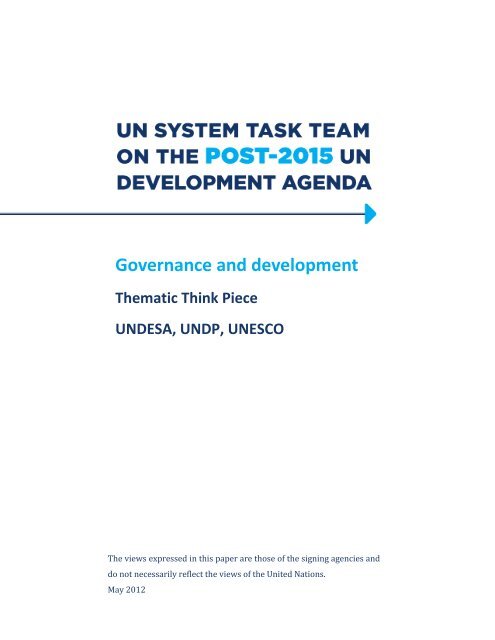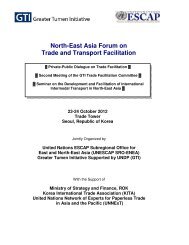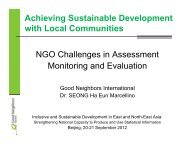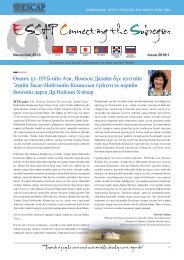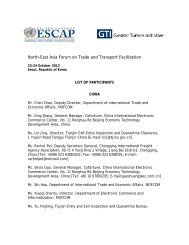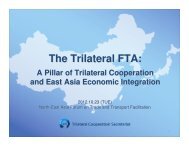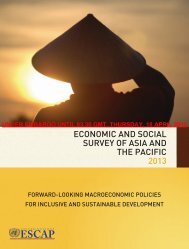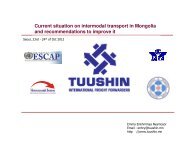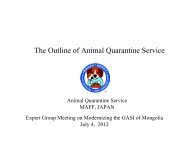Governance and development by UNDESA, UNDP, UNESCO
Governance and development by UNDESA, UNDP, UNESCO
Governance and development by UNDESA, UNDP, UNESCO
You also want an ePaper? Increase the reach of your titles
YUMPU automatically turns print PDFs into web optimized ePapers that Google loves.
<strong>Governance</strong> <strong>and</strong> <strong>development</strong><br />
Thematic Think Piece<br />
<strong>UNDESA</strong>, <strong>UNDP</strong>, <strong>UNESCO</strong><br />
The views expressed in this paper are those of the signing agencies <strong>and</strong><br />
do not necessarily reflect the views of the United Nations.<br />
May 2012
Following on the outcome of the 2010 High-level Plenary Meeting of the General Assembly<br />
on the Millennium Development Goals, the United Nations Secretary-General established<br />
the UN System Task Team in September 2011 to support UN system-wide preparations for<br />
the post-2015 UN <strong>development</strong> agenda, in consultation with all stakeholders. The Task<br />
Team is led <strong>by</strong> the Department of Economic <strong>and</strong> Social Affairs <strong>and</strong> the United Nations<br />
Development Programme <strong>and</strong> brings together senior experts from over 50 UN entities <strong>and</strong><br />
international organizations to provide system-wide support to the post-2015 consultation<br />
process, including analytical input, expertise <strong>and</strong> outreach.<br />
2
<strong>Governance</strong> <strong>and</strong> <strong>development</strong><br />
1. Scope <strong>and</strong> relevance of the issue<br />
<strong>Governance</strong> refers to the exercise of political <strong>and</strong> administrative authority at all levels to<br />
manage a country’s affairs. It comprises the mechanisms, processes <strong>and</strong> institutions,<br />
through which citizens <strong>and</strong> groups articulate their interests, exercise their legal rights, meet<br />
their obligations <strong>and</strong> mediate their differences. 1 Specific reference is made to democratic<br />
governance as “a process of creating <strong>and</strong> sustaining an environment for inclusive <strong>and</strong><br />
responsive political processes <strong>and</strong> settlements.” 2 The institutional <strong>and</strong> human capacities for<br />
governance determine the way in which the effectiveness of public policies <strong>and</strong> strategies is<br />
attained, especially in service delivery.<br />
What does it mean to promote good governance for human <strong>development</strong> Much discussion<br />
about the definition of good governance has centred on what makes institutions <strong>and</strong> rules<br />
more effective <strong>and</strong> efficient, in order to achieve equity, transparency, participation,<br />
responsiveness, accountability, <strong>and</strong> the rule of law. These aspects are crucial for human<br />
<strong>development</strong> <strong>and</strong> the eradication of poverty since ineffective institutions usually result in<br />
the greatest harm to those who are poor <strong>and</strong> vulnerable.<br />
Without reference to a universal st<strong>and</strong>ard for governance, the notion of what is good is thus<br />
defined <strong>by</strong> the desired outcome, which varies from one situation to another. Nonetheless,<br />
two broad governance issues can be discerned. The first pertains to institutions of<br />
governance, including public administration <strong>and</strong> public services connected, in particular,<br />
with the sound management of resources, delivery of <strong>and</strong> equitable access to public services,<br />
responsiveness to the views of citizens <strong>and</strong> their participation in decisions that concern<br />
them. Strategies adopted in response – including better personnel management,<br />
1 Committee of Experts on Public Administration, Definition of basic concepts <strong>and</strong> terminologies in governance<br />
<strong>and</strong> public administration (E/C.16/2006/4) (New York, 2006)<br />
2 United Nations Development Programme, Human Development Report 2011 (New York, 2011)<br />
3
transparency in public finance, a curb on corruption, citizen participation <strong>and</strong> enhanced<br />
accountability – have since become common currency in public administration dialogue. 3<br />
In addition, performance norms have been the subject of debate in the fields of education, 4<br />
health, 5 finance 6 <strong>and</strong> other <strong>development</strong> sectors. Targeted goals within each functional area<br />
tend to echo emergent aspects of administration applicable to all government functions,<br />
namely transparency, accountability, integrity, equity, efficiency <strong>and</strong> responsiveness. 7<br />
The second broad governance issue is concerned with concepts of democracy <strong>and</strong> the rule<br />
of law, including with rights-based claims to equality before the law, judicial independence,<br />
participation in the conduct of public affairs, electoral integrity, political plurality, freedom<br />
of expression <strong>and</strong> media independence. 8 These claims include dem<strong>and</strong>s for gender equality<br />
<strong>and</strong> the inclusion of youth <strong>and</strong> marginalized groups. Integral to effective implementation is<br />
an informed <strong>and</strong> empowered citizenry engaged in transparent <strong>and</strong> accountable governance<br />
processes. Free <strong>and</strong> pluralistic media are considered essential to such ends as is the right to<br />
freely access information held <strong>by</strong> public bodies. 9<br />
The commitment to democratic <strong>and</strong> accountable systems of governance was reaffirmed at<br />
the World Summit in 2005, <strong>and</strong> again <strong>by</strong> Heads of State <strong>and</strong> Government in 2010.<br />
To some, democracy implies certain institutional arrangements, which raises political<br />
sensitivities. Thus, member States point out that, while democracies share common features<br />
such as those just mentioned there is no single model of operation. Rather, democracy is a<br />
“universal value” based on the freely expressed will of the people to determine their own<br />
political, economic, social <strong>and</strong> cultural systems <strong>and</strong> full participation in all aspects of their<br />
3 Some pertinent UN resolutions include General Assembly res. 50/225, 55/61, 66/209 <strong>and</strong> Economic <strong>and</strong><br />
Social Council res. 2011/22<br />
4 <strong>UNESCO</strong>, Overcoming Inequality: Why <strong>Governance</strong> Matters (Paris, 2009)<br />
5 World Health Organization, Health Systems <strong>Governance</strong> (Geneva, 2008)<br />
6 Report of the Secretary-General, Strengthening of institutional arrangements to promote international<br />
cooperation in tax matters, including the Committee of Experts on International Cooperation in Tax Matters,<br />
E/2011/76 (New York, 2011)<br />
7 See, for example, The Dakar Framework for Action: Education for All (Dakar, 2000)<br />
8 General Assembly Resolution 59/201<br />
9 <strong>UNESCO</strong> General Conference Resolution 55 adopted at its 33rd session<br />
4
lives. 10 The blending of transparent, accountable <strong>and</strong> capable institutions of governance<br />
with concepts of democracy <strong>and</strong> the rule of law is common in governance debates as they<br />
are closely connected <strong>and</strong> mutually reinforcing. Member States consider progress in these<br />
areas to be essential for the realization of social <strong>and</strong> people-centred sustainable<br />
<strong>development</strong>. 11<br />
2. Significant trends in governance since 2000<br />
Since the Millennium Summit, a number of changes have taken place with a direct bearing<br />
on State capacity to formulate <strong>and</strong> execute national <strong>development</strong> strategies <strong>and</strong> build public<br />
trust in public institutions. Foremost among these are advances in the use of ICTs. The<br />
evolution of the Internet, including mobile <strong>and</strong> social networking technologies, has enabled<br />
the transformation of public administration in some countries <strong>and</strong> contributed to an<br />
alteration of the balance of power between citizens <strong>and</strong> the State in others. The Information<br />
Society has fostered, inter alia, a nascent open government movement that promotes<br />
transparency, accountability <strong>and</strong> participation, 12 <strong>and</strong> amplified a wave of national freedom<br />
of information laws adopted over the past ten years. 13 It has also renewed debate about the<br />
application of the right to seek, receive <strong>and</strong> impart information through any media <strong>and</strong><br />
regardless of frontiers to the Internet <strong>and</strong> other new information technologies as they apply<br />
to traditional forms of media. 14<br />
Alongside the steady march of technology, one finds an ongoing experiment <strong>by</strong><br />
governments in some contexts with citizen engagement <strong>and</strong> consultative processes <strong>and</strong> an<br />
increasing dem<strong>and</strong> for participation <strong>and</strong> transparency from citizens - many using the new<br />
communication channels provided <strong>by</strong> ICTs, especially social media. This may be a reflection<br />
of increasing complexity of national <strong>and</strong> international affairs <strong>and</strong> a concomitant difficulty in<br />
forecasting the effect of changes to public policy on society <strong>and</strong> the economy. Whereas<br />
matters once discussed in confidence with selected experts or, possibly, representative<br />
10 General Assembly Resolution 66/163<br />
11 General Assembly Resolutions 66/102 <strong>and</strong> 66/159<br />
12 See, for example, the multilateral Open Government Partnership at http://www.opengovpartnership.org/,<br />
13 United Nations Educational, Scientific <strong>and</strong> Cultural Organization, About Freedom of Information, available at:<br />
http://www.unesco.org/new/en/communication-<strong>and</strong>-information/freedom-of-expression/freedom-ofinformation/about/<br />
14 Washington declaration of the <strong>UNESCO</strong> World Press Freedom Day Conference, May 2011<br />
5
stakeholders, governments are increasingly turning to broad-based <strong>and</strong> open consultations<br />
to define problems, explore options <strong>and</strong> forge consensus solutions more attuned to systemic<br />
dynamics. 15<br />
Corruption is an issue that has garnered particular attention since 2000, resulting in the<br />
entry into force in 2005 of the UN Convention against Corruption. Parties to the convention<br />
commit to the establishment of anticorruption bodies, enhanced transparency in the<br />
financing of election campaigns <strong>and</strong> political parties, efficiency of public servants,<br />
recruitment based on merit, transparency <strong>and</strong> accountability in matters of public finance<br />
<strong>and</strong> generally high st<strong>and</strong>ards of conduct in all areas of public affairs – in addition to tighter<br />
regulation of business <strong>and</strong> private financial transactions.<br />
Recent events in the Arab States have again brought to the fore longst<strong>and</strong>ing dem<strong>and</strong>s from<br />
young people for a <strong>development</strong> trajectory grounded on democratic governance, the rule of<br />
law <strong>and</strong> human rights. It has highlighted where the internationally agreed <strong>development</strong><br />
agenda has failed to respond to core governance dem<strong>and</strong>s of populations. Across the world<br />
since 2005, it has been increasingly clear that democratic deficits lie at the core of critical<br />
<strong>development</strong> challenges related to state fragility, transition <strong>and</strong> social <strong>and</strong> political violence,<br />
inequality in the enjoyment of the benefits of growth <strong>and</strong> natural resources, increased<br />
dem<strong>and</strong>s on the natural environment <strong>and</strong> a global crisis of confidence in the integrity,<br />
capacity <strong>and</strong> legitimacy of the state to deliver on human <strong>development</strong>.<br />
3. Incorporation of governance into post-2015<br />
Experience to date with the Millennium Development Goals has shown that, in many cases,<br />
sustained progress towards the MDGs has been underpinned <strong>by</strong> good governance <strong>and</strong><br />
women’s empowerment, <strong>and</strong> hampered <strong>by</strong> their absence. 16<br />
15 See, for example, O’Malley, P., Public Consultation <strong>and</strong> the Government of Canada: A Brief History <strong>and</strong> Some<br />
Related Issues, from a commissioned study on legislative <strong>and</strong> regulatory consultation practices<br />
16 See, for example, United Nations Development Programme, Human Development Report: Deepening<br />
Democracy in a Fragmented World (New York, 2002); United Nations Development Programme, The Path to<br />
Achieving the MDGs: a synthesis of evidence from around the world (New York, 2010); United Nations<br />
Development Programme, Beyond the Mid-point: achieving the MDGs (New York, 2010)<br />
6
Having identified good governance as a concern common to all countries, questions arise as<br />
to how member States might capture its various dimensions in a global <strong>development</strong><br />
framework. Would it be feasible to propose explicit governance goals <strong>and</strong> targets in their<br />
own right Should governance challenges be set out as part of the enabling conditions that<br />
need to be strengthened to foster <strong>development</strong> Or, would it be better to mainstream<br />
governance issues into other <strong>development</strong> goals so as to build synergies among various<br />
<strong>development</strong> themes<br />
Clearly much depends on the scope <strong>and</strong> format of the post-2015 <strong>development</strong> agenda. As<br />
noted earlier, objectives such as transparency, accountability, inclusion <strong>and</strong> so on apply<br />
both in general <strong>and</strong> to specific sectors. They reflect fundamental principles, such as<br />
openness, equity <strong>and</strong> engagement, while at the same time enabling achievement of<br />
particular <strong>development</strong> outcomes, such as poverty reduction, education for all <strong>and</strong><br />
environmental protection. Thus, as a technical matter there appears to be some latitude in<br />
the formulation.<br />
One approach may be to reiterate a set of principles for the exercise of political <strong>and</strong><br />
administrative authority at national <strong>and</strong> local levels. Drawing on international human rights<br />
treaties, the UN Convention against Corruption <strong>and</strong> other major agreements with near<br />
universal participation, such principles, clearly <strong>and</strong> simply stated in the post-2015<br />
<strong>development</strong> agenda, might encompass commitments to increased transparency, enhanced<br />
accountability <strong>and</strong> oversight, stakeholder engagement <strong>and</strong> participation in decision-making,<br />
judicial independence <strong>and</strong> so on. Many of these principles have already been established as<br />
global reference points. Their non-binding nature in the context of the post-2015 agenda<br />
would help to reassure countries, especially those most challenged <strong>by</strong> weak institutions <strong>and</strong><br />
issues with peace <strong>and</strong> security, that there is no conditionality attached. Such an approach,<br />
however, could be seen to avoid the lessons learned from the MDGs where principles<br />
without measures were not taken as a priority. If governance principles are adopted, their<br />
implementation would need to be regularly monitored <strong>and</strong> reported to generate the<br />
necessary impetus for moving forward.<br />
7
A more direct approach could also be considered where<strong>by</strong> countries commit to governance<br />
as a goal within the existing MDG-type framework as has been done in a few countries,<br />
accompanied <strong>by</strong> operational targets in specific sectors, for example working to enhance<br />
taxation, court administration or statistical capacity at the national level. This could provide<br />
a stronger basis for galvanizing support, particularly if also linked to other goals such as<br />
gender equality.<br />
Whatever form the framework takes, it must both be premised on <strong>and</strong> support governance<br />
for peaceful, inclusive <strong>and</strong> responsive human <strong>development</strong>. In particular, it should lead<br />
member States <strong>and</strong> <strong>development</strong> actors to:<br />
• Focus on strengthening institutions <strong>and</strong> human resource capacities at all levels,<br />
concentrating on parliaments, electoral bodies <strong>and</strong> related processes, the security<br />
<strong>and</strong> justice sectors, public services, <strong>and</strong> promoting coherence across institutions;<br />
• Support a state-society compact <strong>and</strong> culture grounded in constitutionalism, access<br />
to justice, equality <strong>and</strong> human rights;<br />
• Assist public institutions to become effective, responsive, accountable <strong>and</strong><br />
representative through e-government <strong>and</strong> other means, foster public sector<br />
capacities <strong>and</strong> public-private partnerships at national <strong>and</strong> sub-national levels,<br />
prevent corruption <strong>and</strong> promote the transparent <strong>and</strong> sustainable management of<br />
public goods <strong>and</strong> financial <strong>and</strong> natural resources;<br />
• Support capacity for cross-sectoral, integrated <strong>and</strong> inclusive decision-, policy- <strong>and</strong><br />
law-making, at all levels;<br />
• Ensure the strengthening of citizen participation <strong>and</strong> civil society organizations’<br />
engagement, including through e-participation, to ensure accountability <strong>and</strong><br />
transparency <strong>and</strong> better inform decision-making;<br />
• Support transparency <strong>and</strong> the right to access information about public affairs,<br />
encouraging states to adopt <strong>and</strong> implement legislation ensuring broad access to<br />
information <strong>by</strong> the public, including through the use of mobile, social media <strong>and</strong><br />
other appropriate technologies;<br />
8
• Strengthen the environment for an independent <strong>and</strong> pluralistic media, <strong>and</strong> ensure<br />
that the media serve the needs of society <strong>by</strong> reflecting a diversity of political views,<br />
cultures, languages <strong>and</strong> beliefs.<br />
<strong>Governance</strong> monitoring <strong>and</strong> capacity <strong>development</strong> could usefully draw on the work of DESA,<br />
<strong>UNDP</strong>, the World Bank, OECD <strong>and</strong> others, while taking into account that implementation<br />
measures must be country-owned, <strong>and</strong> useful to national governments <strong>and</strong> other national<br />
stakeholders in the diversity of settings in which the UN operates, including in countries<br />
emerging from conflict <strong>and</strong> those in transition.<br />
4. Incorporation of the governance issue in intergovernmental<br />
processes<br />
The Economic <strong>and</strong> Social Council <strong>and</strong> its subsidiary bodies are currently considering their<br />
role in the elaboration of <strong>and</strong> follow-up to the post-2015 <strong>development</strong> agenda. The<br />
functional commissions have been invited to prepare written inputs on cross-cutting <strong>and</strong><br />
emerging issues that should find their place in the post-2015 <strong>development</strong> agenda. Inputs<br />
received <strong>by</strong> the end of 2012 may be fed into the contribution <strong>by</strong> the Council to the special<br />
event to be held during the 68th session of the General Assembly next year to follow-up on<br />
efforts towards achieving the MDGs.<br />
Recognizing the importance of promoting a coherent, evidence-based approach to the<br />
governance issue, the Committee of Experts on Public Administration considered how it<br />
might contribute to discussions on the post-2015 agenda at its 11th session. 17 The<br />
Committee reinforced many of the points made above <strong>and</strong> expressed interest in studying<br />
the effect of specific national <strong>and</strong> local governance practices on <strong>development</strong> with a view to<br />
sharing the findings with ECOSOC at the 2013 substantive session.<br />
17 CEPA, 11th session, 16-20 April 2012, report forthcoming. The Committee is a st<strong>and</strong>ing expert body of the<br />
Economic <strong>and</strong> Social Council<br />
9
5. Conclusion<br />
The new framework must be based on an underst<strong>and</strong>ing of the importance of <strong>and</strong> a<br />
commitment to further promote resilient, legitimate <strong>and</strong> inclusive national <strong>and</strong> local<br />
institutions, as well as inclusive participation in public processes. It must address<br />
institutional <strong>and</strong> governance bottlenecks to ensure transformative <strong>and</strong> sustainable<br />
<strong>development</strong>. It must encourage the identification <strong>and</strong> support of options <strong>and</strong> initiatives<br />
that enhance the collaborative capacities of empowered societies to find peaceful, effective<br />
<strong>and</strong> long-term solutions to global, national <strong>and</strong> local <strong>development</strong> challenges.<br />
10
UN System Task Team on the Post-2015 UN Development Agenda<br />
Membership<br />
Department of Economic <strong>and</strong> Social Affairs (DESA), Co-Chair<br />
United Nations Development Programme (<strong>UNDP</strong>), Co-Chair<br />
Convention on Biological Diversity (CBD)<br />
Department of Public Information (DPI)<br />
Economic Commission for Africa (ECA)<br />
Economic Commission for Europe (ECE)<br />
Economic Commission for Latin America <strong>and</strong> the Caribbean (ECLAC)<br />
Economic <strong>and</strong> Social Commission for Asia <strong>and</strong> the Pacific (ESCAP)<br />
Economic <strong>and</strong> Social Commission for Western Asia (ESCWA)<br />
Executive Office of the Secretary-General (EOSG)<br />
Food <strong>and</strong> Agricultural Organization of the United Nations (FAO)<br />
Global Environment Facility (GEF)<br />
International Atomic Energy Agency (IAEA)<br />
International Civil Aviation Organization (ICAO)<br />
International Fund for Agricultural Development (IFAD)<br />
International Labour Organization (ILO)<br />
International Maritime Organization (IMO)<br />
International Monetary Fund (IMF)<br />
International Organization for Migration (IOM)<br />
International Telecommunication Union (ITU)<br />
Joint United Nations Programme on HIV/AIDS (UNAIDS)<br />
Non-Governmental Liaison Service (NGLS)<br />
Office of the Deputy Secretary-General (ODSG)<br />
Office of the High Commission for Human Rights (OHCHR)<br />
Office of the High Representative for the Least Developed Countries, L<strong>and</strong>locked Developing<br />
Countries <strong>and</strong> Small Isl<strong>and</strong> Developing States (OHRLLS)<br />
Office of the Special Advisor on Africa (OSAA)<br />
Peace building Support Office (PBSO)<br />
United Nations Children’s Fund (UNICEF)<br />
United Nations Conference on Trade <strong>and</strong> Development (UNCTAD)<br />
11
United Nations Convention to Combat Desertification (UNCCD)<br />
United Nations Educational, Scientific <strong>and</strong> Cultural Organization (<strong>UNESCO</strong>)<br />
United Nations Entity for Gender Equality <strong>and</strong> Empowerment of Women (UN Women)<br />
United Nations Environment Programme (UNEP)<br />
United Nations Framework Convention on Climate Change (UNFCCC)<br />
United Nations Fund for International Partnerships (UNFIP)<br />
United Nations Global Compact Office<br />
United Nations High Commissioner for Refugees (UNHCR)<br />
United Nations Human Settlements Programme (UN-HABITAT)<br />
United Nations Industrial Development Organization (UNIDO)<br />
United Nations International Strategy for Disaster Reduction (UNISDR)<br />
United Nations Institute for Training <strong>and</strong> Research (UNITAR)<br />
United Nations Millennium Campaign<br />
United Nations Office for Outer Space Affairs (UNOOSA)<br />
United Nations Office for Project Services (UNOPS)<br />
United Nations Office on Drugs <strong>and</strong> Crime (UNODC)<br />
United Nations Population Fund (UNFPA)<br />
United Nations Relief <strong>and</strong> Works Agency for Palestinian Refugees in the Near East (UNRWA)<br />
United Nations Research Institute for Social Development (UNRISD)<br />
United Nations System Chief Executives Board for Coordination Secretariat (CEB)<br />
United Nations University (UNU)<br />
United Nations Volunteers (UNV)<br />
United Nations World Tourism Organization (UNWTO)<br />
Universal Postal Union (UPU)<br />
World Bank<br />
World Food Programme (WFP)<br />
World Health Organization (WHO)<br />
World Intellectual Property Organization (WIPO)<br />
World Meteorological Organization (WMO)<br />
World Trade Organization (WTO)<br />
12


